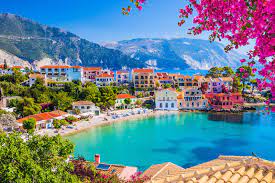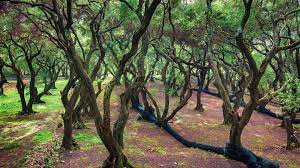Cool nights needed for olive trees in Greece

Athens: Winter has finally arrived in Greece, with temperatures dropping from 20 ºC to around 14 ºC in the south of the country and remaining below 10 ºC in the north, suggesting that the country’s olive trees could receive the much-needed chill hours necessary for rich fruition ahead of the 2024/25 crop year.
In the current 2023/24 crop year, the combination of prolonged warm weather and an ‘off-year’ in the natural alternate-bearing cycle of the olive trees has led to limited yields of olive oil and table olives across the country.
Olive trees in Greece need around 200 chill hours. Given that we had warm weather in the country until Christmas, the trees need about 20 to 30?days of continuous mild cold weather… to be productive in the next crop year.
Despite the advent of colder days, producers still have widespread concern about the impact of the rapid weather fluctuations the country is experiencing on the next crop.
“We are still in limbo when it comes to the fruiting of our olive trees for the next harvest, hoping that they will not start to blossom too early as was the case last year,” Zaharoula Vassilaki who grows 5,000 olive trees on the northern Halkidiki peninsula, told Olive Oil Times.

“According to our consultant on organic farming, the weather in Halkidiki will likely be very erratic during the next two months,” she added. “Part of February is expected to be cold, while it may get warmer towards the end of the month, and the cold with some snow may return in March. This is a completely irregular weather pattern we are facing here.”
Vassilaki also said that the olive varieties grown in northern Greece require more chill hours than varieties grown in the rest of the country.
She also noted that the unstable weather that has dominated Halkidiki in recent years has disrupted the pattern of olive cultivation on the peninsula.
“The olive trees need a long period of cold weather to hibernate and then bear fruit,” she said. ”When cold and warm weather alternate in a matter of a few days, this is simply impossible. Our fathers and grandfathers were satisfied with one month of continuous cold, but we should be happy with just two weeks of cold now.”
Other olive oil-producing regions across Greece also feel the effects of the abnormal winter weather.
Messenia in the southern Peloponnese, one of the country’s most bountiful olive oil-producing regions, is expected to yield around 40,000 tons this year, down by more than 30 percent compared to last year and even lower in some parts of the region.
“We grow Koroneiki trees in our area, and we expect to get around half of the previous harvest,” said producer Asimakis Demeroukas from Gargaliani, in western Messenia.
“The cause is the combination of high winter temperatures and the prolonged drought, which prevented the olive flowers from turning into fruits,” he added. “February generally needs to be cold and wet for the olive trees to be productive. However, last February was warm and dry, resulting in a reduced flowering of the trees.”
On the island of Lesbos, another traditional olive oil-producing region of the country lying in the eastern Aegean Sea, producers have come to terms with the new norm of low olive oil yields.
“We had signs in the previous years of the situation we are facing now,” said local producer Aristeidis Sifneos.
“We have lost the four seasons,” he added. “The blossoming period in May is not followed by a robust flowering-setting procedure as it should. Instead, we get prolonged dry weather from May until mid-September and sometimes until later.”
Last year, the olive oil produced on Lesbos reached 30 to 40 percent of the island’s capacity. This year, the island’s olive oil yield is expected to fare even lower at only 20 to 25 percent of capacity. In good times, olive oil production on Lesbos exceeds 15,000 tons.
Olive trees are usually associated with sunny regions such as the Mediterranean. However, the trees need to be exposed to a certain period of relatively low temperatures in winter, known as chill hours, to break bud dormancy and produce olive fruits. Chill hours are counted only when the tree is dormant, meaning it is not actively flowering or growing.
“The olive tree is one of the few evergreen trees that need the influence of cold to bloom,” agronomist Nikos Bartsokas told Olive Oil Times. “The buds that emerge in the summer need low temperatures in the winter to differentiate into flowers and then fruits.”
“Some Greek olive varieties, including the Koroneiki, Megaritiki and Kolovi, can form flowers at a maximum temperature of 16 ºC,” Bartsokas added. “Other varieties, mostly grown in northern Greece, such as the Halkidiki and Amfissis, need lower temperatures of around 12 ºC.”
“On the other hand, prolonged exposure to freezing temperatures below –7 ºC can seriously damage the olive trees,” he said.
Bartsokas also noted that olive trees tend to have biennial cropping, bearing fruit on shoots a year old.
“In May each year, new vegetation is formed simultaneously with the tree’s flowering, which can reach a length of a few centimeters up to 30 to 50?centimeters,” he said. “In May of the following year, this vegetation will produce flowers, which will finally become the olive fruits.”
“However, in the last decades, we have consistently used means such as amino acids and trace elements to make them bear fruit annually,” Bartsokas added.
Concerning the 2024/25 crop year, Bartsokas pointed out that the next couple of months will be crucial for the fruit setting of olive trees in Greece.
“On average, and depending on the olive variety and the area of cultivation, olive trees in Greece need around 200 chill hours to bear fruit in spring,” he said. “Given that we had warm weather in the country until Christmas this year, the trees need about 20 to 30?days of continuous mild cold weather in February or March to be productive in the next crop year.”
“This is the most burning issue in the Greek olive sector this time of the year, and it remains to be seen whether the weather conditions will favor the olive trees and the farmers in our country,” Bartsokas concluded.





